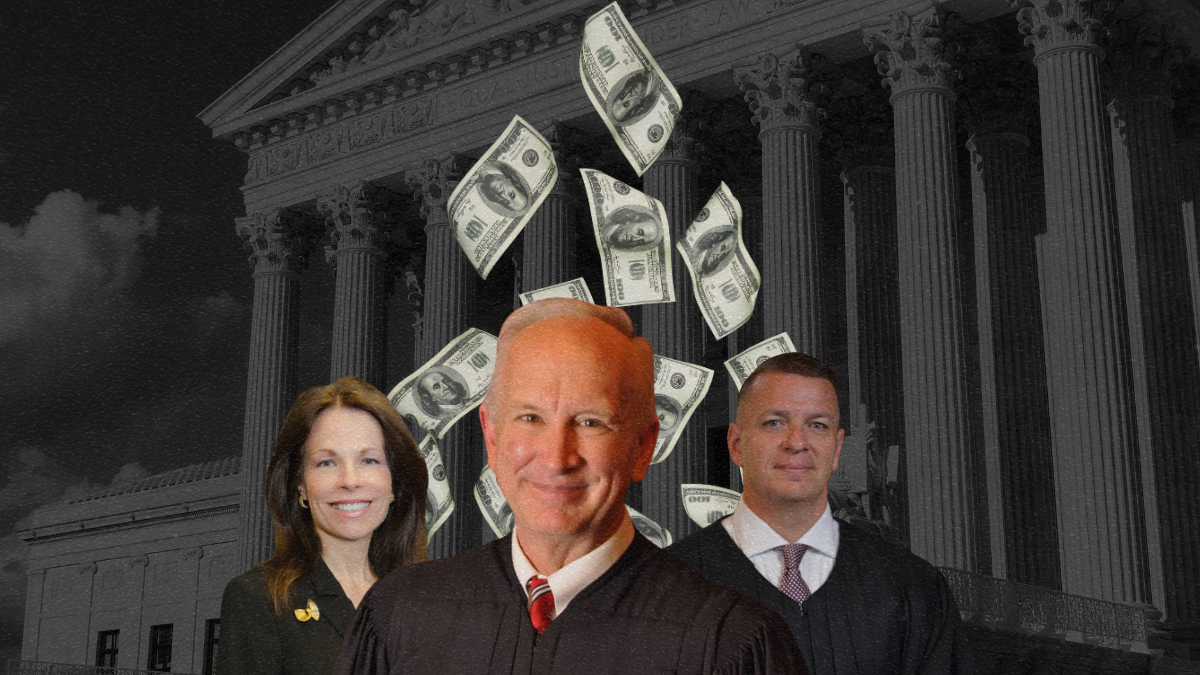Source: Governing
It’s good to have friends in high places, and it’s especially true when those friends are state Supreme Court justices who have no judicial ethics and who also happen to be ruling on your case.
A recent article in Governing took a look at several states in which Supreme Court justices have been ruling in cases where conflicts of interest appear obvious, including some involving family members. The Supreme Court of North Carolina, which now has a 5-2 right-wing Republican majority, is one of the courts featured in the story.
Just like some of the Republican justices on the U.S. Supreme Court, some of our state high court’s Republican justices have been disregarding ethics rules and traditional recusal practices. And seemingly, they’re getting away with it.
Multiple Republican justices on the N.C. Supreme Court have refused to recuse themselves from cases where there is a clear and obvious conflict of interest and have instead heard and then ruled on those cases.
The first conflict of interest Governing looked at is the direct financial conflict that Chief Justice Paul Newby and Justice Tamara Barringer have with Duke Energy. Newby and his wife own more than $10,000 worth of Duke Energy stock, according to Governing, and Barringer said her husband owns $10,000 in stock as well.
The state’s ethics rules say that judges should recuse themselves any time hearing a case would raise an appearance of bias – including when they have a financial interest at stake.
Newby has heard six cases against Duke Energy and ruled in the company’s favor every time. If Barringer is put on a Duke Energy case and is asked to recuse herself, she can either decide for herself or ask the other justices. The process of referring a recusal question to the other justices was established two years ago when Justice Phil Berger Jr. was involved in a fierce battle over whether he could hear lawsuits against his father, state Senate leader Phil Berger.
In 2021, when the younger Berger joined the court, Democrats held a majority and intended to disqualify him from cases involving his father. Republican lawmakers in the General Assembly threatened to impeach any justice who voted to keep Berger off those cases. The court dropped the issue and allowed Berger to decide for himself whether or not to recuse himself. He decided against recusal and ended up ruling in his father’s favor, which he has since done two more times.
Earlier this year, Berger referred to the full court the question of whether he should recuse himself from the Leandro school funding lawsuit because his father is being sued in the case. Berger said that his “unilateral action in this matter could undermine public confidence,” but Democratic Justice Allison Riggs wrote in her dissent that Berger had already taken unilateral action when he ruled for his father in the three previous cases.
Despite the extremely clear conflict of interest, the Republicans on the court ruled that Berger could stay on the case involving his father because he was being sued in his “official capacity” as the leader of the state Senate.
Riggs also noted in her dissent that “few bonds are closer” than a child and parent. She argued that the court’s ruling in the case could impact “Sen. Berger’s ability to deliver on his policy objectives. … Put bluntly, a son’s vote to deliver his father a campaign ‘win’ in an election year substantially affects the latter’s personal and financial interests.”
It is extremely concerning that the Republicans on the court, led by the chief justice himself, are so openly ignoring judicial ethics and norms to rule in favor of their family members and companies they own stock in.
Though shocking and disappointing, this is all entirely unsurprising for those who know the way Newby runs his court. The chief justice’s tenure on the North Carolina Supreme Court has so far been marred by accusations of politicization and a disregard for judicial impartiality.
Newby isn’t doing himself any favors when it comes to changing perceptions about his behavior on the bench considering that he has moved judges around the court after they made rulings against the NCGOP’s interests and has also been accused of being personally behind the effort to investigate fellow Supreme Court Justice Anita Earls who, as the only Black woman on the court, spoke out against racial and gender biases within the state court system.
Polling now shows that Americans have lost confidence in the U.S. Supreme Court. A Marquette Law School national survey from February found that 60% of Americans disapprove of the job that the Supreme Court is doing. The public has learned about billionaires giving gifts to Justice Clarence Thomas and taking him on trips, among other potential conflicts of interest on the highest court in the land, and that has only made trust in the judiciary worse.
Given the plummeting faith that the American people have in our court system, it is inexcusable that judges would hear cases involving their family members or companies that they own stock in. In every state in our country, judicial ethics rules tell judges to avoid not just bias, but even the appearance of bias. It may be time North Carolina’s Republican Supreme Court justices take a look at the rules they’re supposed to be following.





